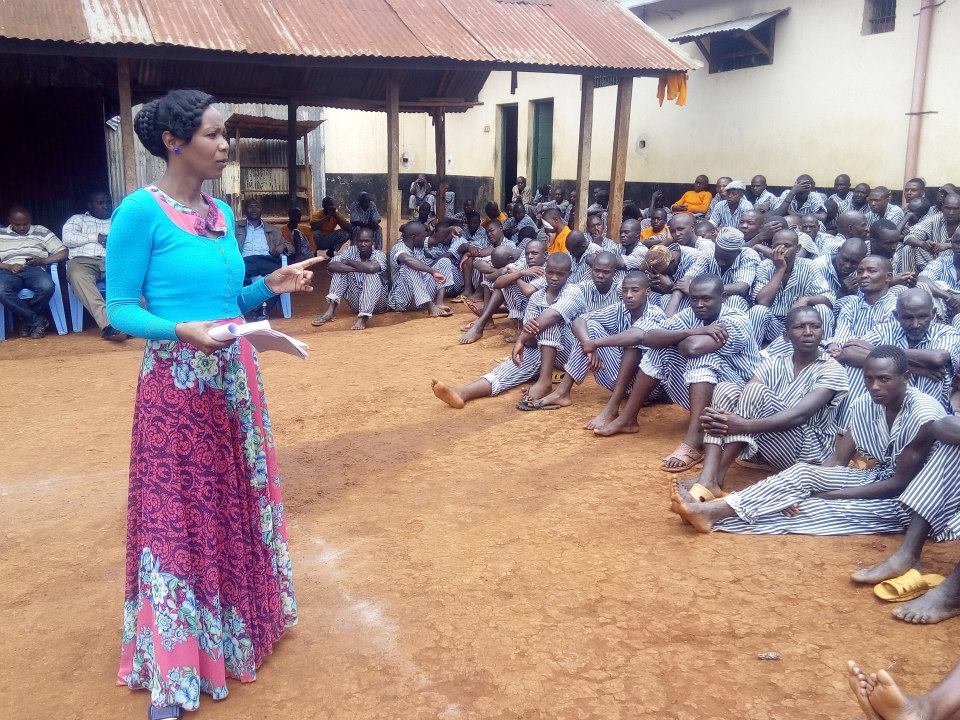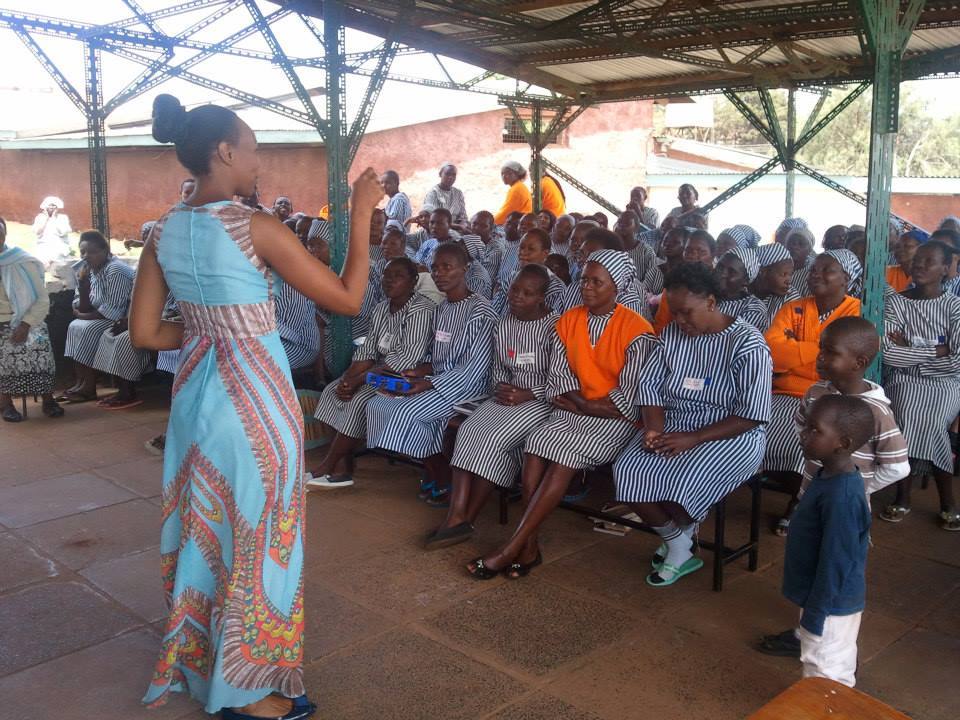Teresa Njoroge: Sentenced to social entrepreneurship
There's just over a week until the 2015 Sankalp Global Forum opens its doors in Delhi, so we’ve talked to one of this year’s speakers, Teresa Njoroge, about her extraordinary journey from a Kenyan prison into the world of social entrepreneurship and why she’s leaving her ego at the door to make meaningful connections in India’s capital.
Aged 37, having built a successful career working for some of the world’s most prestigious international banks, Teresa Njoroge’s life changed dramatically.
She was arrested in connection with a major fraud case in Nairobi that involved the loss of Sh9.8 million and was given a 12-month prison sentence for allegedly conspiring to commit fraud.
After serving her sentence and having been exposed to the conditions of prison life and witnessing through her fellow inmates the seemingly never-ending cycle of poverty and petty crime, Teresa started up a charity called Support Me in My Shoes (SMiMS).
Since 2014, SMiMS has worked to increase national awareness around the challenges facing women released from prison – a number of whom have been sentenced for petty crimes connected to living in poverty. SMiMS offers entrepreneurship programmes for former prisoners, which includes training programmes, practical business support and startup capital.
 Teresa teaching Kiambu Prison Inmates. Photo credit: SMiMS
Teresa teaching Kiambu Prison Inmates. Photo credit: SMiMS
At the start of this year, Teresa also launched Clean Start – a social enterprise cleaning company which offers training and employment opportunities for marginalised women inmates and ex-inmates to provide them with secure employment and prevent them from reoffending.
Pioneers Post: Would you go back and change what happened with the fraud case if you could, even if it meant that Clean Start and SMiMS would not have been founded?
Teresa Njoroge: Banking was my first love. I worked hard to become an expert and was fortunate enough to work for some of the world’s most prestigious international Banks in Nairobi. However, I would not trade the journey and the experience that led me into social entrepreneurship for anything.
If I’d never unknowingly handled that fraudulent transaction, I’d never have understood what poor women convicted for petty crimes go through in Kenya.
When convicted of a crime I didn’t commit, I was unable to afford bail pending appeal. Suddenly, I was serving a 12-month sentence in Langata women's maximum security prison. You can’t possibly understand what this feels like unless you’ve experienced it yourself. I felt like a nobody, stuck in a deep pit where no one could hear my cries for help.
Out of this extreme hardship and hopelessness, SMiMS Africa and now recently Clean Start were born. My inspiration is to deliver social justice progress and economic empowerment for the more than 20,000 women who are behind bars in Kenya due to poverty-related petty crimes.
I’ve learned we have the power and capabilities to bring change in the areas that ail our societies. I am committed to not only advocating for change, but delivering it to Kenya’s criminal justice system. My life’s mission is to provide hope and reintegration into society for those imprisoned for petty crimes or crimes they didn’t commit.
This is how I will change what happened with the fraud case.
Clean Start will ensure that women leaving our correctional facilities have a bridge to reintegrate into society with income and dignity. Employment as cleaners upon release will help break an otherwise hopeless cycle of crime and poverty in Kenya.
 Teresa teaching inmates at Langata Women Prison. Photo credit: SMiMS
Teresa teaching inmates at Langata Women Prison. Photo credit: SMiMS
PP: In January you were named the 2015 Spark* Kenya Changemaker of the year – what key lessons have you learnt about starting up a social business that would help aspiring social entrepreneurs in Kenya and around the world?
TN: As a social entrepreneur you start with the solution to the problem that you are trying to solve or the desired impact.
At SMiMS Africa, there were two objectives:
- Reduce the number of women behind bars
- Reduce unacceptably high levels of recidivism due to poverty-related petty crimes
You need a coach! You cannot do it alone
I had a broad vision for how to start achieving that desired impact, but until you get out there and start doing it, you don’t really know what form it will take.
For almost all of 2014 I was out there, experimenting and learning. This was an important part of the journey. I had that ‘light bulb’ moment in early 2015 when at the Spark* Kenya accelerator program, where with the help of Chris Ball one of the mentors at Spark* International, I came up with the Clean Start Solution.
You need a coach! You cannot do it alone, in addition to your team, you need a lot of support from mentors and business advisors with whom you closely monitor and evaluate your start-up.
Do your research well on which accelerators to join, your goals must be aligned to the programme's expertise. Ask yourself – do you need to refine your business model, have you identified your customer segments and do you have enough capital to build your product or do you need to raise more money?
During your early years, do not be concerned about whether or not you have the right answers and who will get the credit for the idea. Dedicate your time as commitment to your start-up and grow your networks. Have your co-founders, your investors and your customers or target group all engaged in the mission.
PP: To what extent do you feel there is a strong community of social entrepreneurs in Kenya? And to what extent is this community representative of both men and women?
TN: Even though there is no formal and widely recognised social enterprise body in Kenya, the informal community of social entrepreneurs in Kenya is very strong and we meet regularly through collaborations and support of each other's projects. Women face stiff competition from well established male-dominated enterprises and we are still fighting for our space in development issues.
However, overall I’m tremendously excited and honoured to be a part of this community and indeed, to be a woman making it happen within this community. Being an entrepreneur is tough, so we must help each other and grow together.
PP: What are the biggest challenges facing social entrepreneurs in Kenya and what can be done to solve some of these – from both a government and private sector perspective?
TN: Aspiring entrepreneurs who wish to scale their ideas and have massive impact in Kenya are undermined by lack of funds. The inability to raise capital to turn ideas and dreams into reality is the number one challenge.
The government of Kenya can help directly by assigning budget funds to go into the social entrepreneurship growth space. There are many ways they can stimulate growth in the space, from grants to tax breaks and other regulatory incentives.
I’d also like to see removal of red tape to make it cheaper and easier for social entrepreneurs to get legal accreditation as it’s currently too slow and expensive to get any business started in Kenya.
For the private sector, where profit maximisation is its number one objective, social issues are increasingly a direct imperative for profitability. We live in a world where consumers are increasingly demanding and indeed valuing products and services, which account for social impact. This above all else is what will drive the deepest and most profound change in the world.
This is a massive opportunity, not only for social enterprises such as Clean Start, but for everyone from government the private sector, the not-for-profit sector and everyone in between.
There is need for a meeting point to strengthen the entrepreneurial ecosystem in Kenya, that will create platforms for knowledge sharing and facilitate collaboration between all.
PP: What are the key issues for social entrepreneurs you are looking forward to discussing at Sankalp in Delhi?
TN: I’m thrilled to be attending the 7th Global Sankalp Summit in Delhi with the support of Intellecap and, to be connecting with fellow social entrepreneurs, investors and industry experts.
There’s nothing wrong with some healthy competition, but if we collaborate and support one another, our combined impact can be much greater
Beyond general knowledge-sharing and networking, I look forward to discussing how we as a community tackle the issues I raised before: access to capital, especially early stage seed funding.
I’ll also share my experience as a member of Spark* International’s 2015 intake of social entrepreneurs in Kenya and detail how they’re helping me to execute my vision for Clean Start. Beyond funding, education and support are critical to growth in the social entrepreneurship space.
There are many of the same challenges faced by social entrepreneurs regardless of where they are in the world and especially in developing countries such as India and Kenya.
There’s a huge opportunity at Sankalp for us as entrepreneurs to leave our egos at the door and work together to help one another. There’s nothing wrong with some healthy competition, but if we collaborate and support one another, our combined impact can be much greater.
One of my top objectives at the summit will be to find partners to collaborate with and ways to overcome the hurdles I've mentioned.
Pioneers Post is thrilled to be a media partner at the 2015 Sankalp Global Forum, which is being held in Delhi on 9 and 10 of April. The Forum will bring together social entrepreneurs, social investors and policymakers from all over the world to tackle the theme of this year's event – Fueling the Innovation Economy – by debating the roles of government, the private sector and capital. Find out more here.
Header image: From behind a wire fence separating visitors from inmates, women from Langata Maximum Security Prison perform during celebrations of “Talent Behind Bars”, a programme held for International Day of the Gifted by the Government of Kenya and representatives from NGOs. 10 August 2012
Photo credit: Georgina Goodwin



